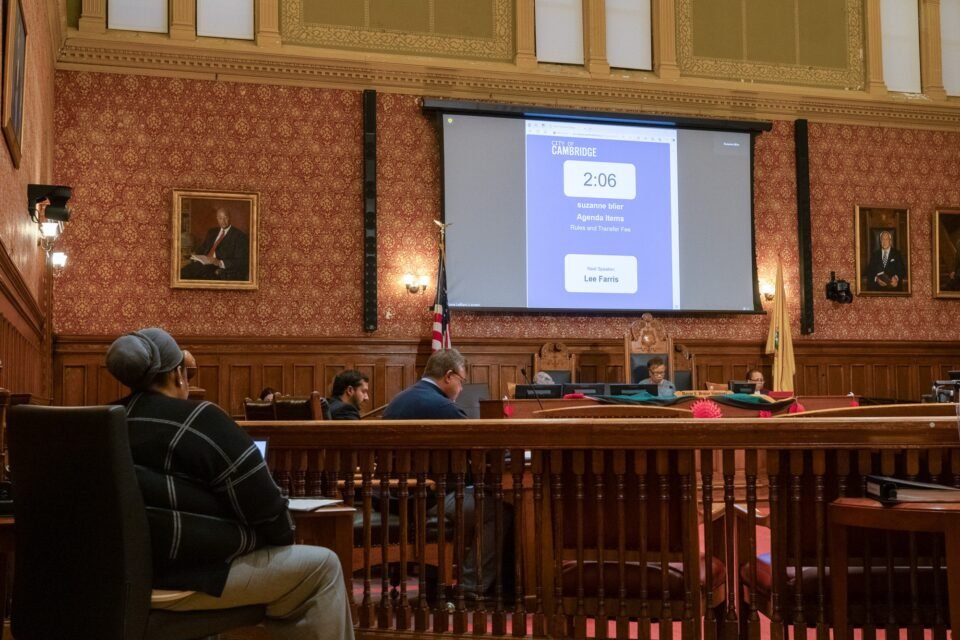The Cambridge City Council voted to support a tax on large real estate transactions and discussed the feasibility of municipally-funded housing vouchers during a Monday evening meeting.
Councilors voted 6-2 to endorse keeping local option transfer fees a part of the state Affordable Homes Act, which is currently being reviewed by the Massachusetts House of Representatives.
Under the current version of the AHA, Massachusetts municipalities would have the authority to impose a tax of between 0.5 and 2 percent on real estate transactions of more than $1 million, with revenues going to fund affordable housing projects.
Based on an estimate from the state Executive Office of Housing and Livable Communities, Middlesex County — in which Cambridge is located — could raise more than $131 million for each 1 percent tax on large real estate transactions.
Councilors expressed hope that the additional revenue resulting from the tax could help alleviate Cambridge’s longstanding affordable housing crisis.
But some local advocates urged the Council to reject the policy order, raising concerns over the additional cost to homeowners.
“The reality is that this is not a fee for municipalities. It is actually another fee for every homeowner in Cambridge whose property is valued over a million dollars,” Denise Jillson, the executive director of the Harvard Square Business Association, said during the Monday meeting.
“I urge you to consider what a local option transfer fee will mean to residential property owners in Cambridge,” Jillson added, “particularly those who are older and may be looking to downsize, those who are younger with families and need to upsize, and every home or condo owner who might be counting on their most valuable asset — their home — to maintain financial security and, for some, their independence.”
However, councilors stressed that the provision itself would not immediately impose the real estate tax in the city.
“It is really important, though, to note that this legislation does nothing to enact a tax of any kind or a fee of any kind in Cambridge,” said Councilor Patricia M. “Patty” Nolan ’80.
“What it would allow is local control for municipalities across the state to decide whether to implement a transfer fee that reflects the reality of the markets within their own city,” Nolan added.
Jillson suggested the tax was unnecessary, citing numerous programs the city has implemented to support affordable housing development, and the relative abundance of affordable housing in Cambridge.
“These programs have resulted in 15 percent of the housing stock in Cambridge deemed affordable,” said Jillson. “While there are a few communities with higher percentages, it is important to note that the statewide average is 10 percent. Cambridge far exceeds that.”
Cambridge Residents Alliance President Lee Farris disputed the sentiment, pointing to the Envision Cambridge plan, the city’s blueprint for 2030.
“It says we’re trying to get to 20 percent income-restricted affordable housing in the city,” said Farris, referring to goals laid out in the Envision plan. “If some speakers don’t like that, they’re going against what the city has already said it wants to do.”
The Council also debated issuing municipally-funded housing vouchers in partnership with the Cambridge Housing Authority, ultimately referring it to the Council’s Housing Committee.
The CHA currently provides housing vouchers under the federal Section 8 Housing Choice Voucher Program, which pays for low-income residents to rent an apartment in the private market. City funding for housing vouchers would increase the number of Cambridge residents who receive this assistance.
“Voucher holders can have flexibility on what part of the city they want to live in,” Farris said. “While I certainly think we need to build more income-restricted affordable housing, vouchers are really important in preventing displacement of lower-income people in the short term, in a faster timeframe than is possible by building new affordable units.”
—Staff writer Laurel M. Shugart can be reached at laurel.shugart@thecrimson.com. Follow them on X @laurelmshugart or on Threads @laurel.shugart.
—Staff writer Olivia W. Zheng can be reached at olivia.zheng@thecrimson.com. Follow her on X @oliviawzg.

